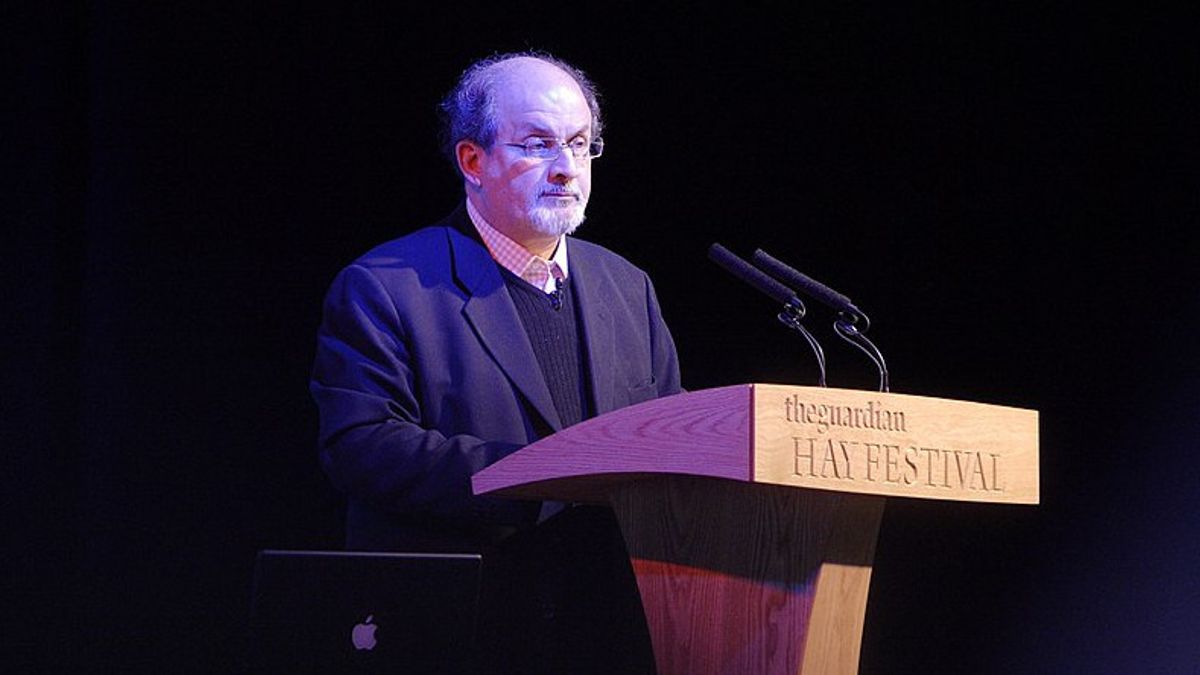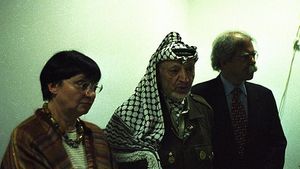
JAKARTA - Life has experienced the danger of being experienced by the world's famous writer, Salman Rushdie. Rushdie's invention novel, The Satanic Verses (Ayat-ayat Satan) is behind it. The presence of the novel published in 1988 is considered controversial.
Rushdie is said to have insulted Islam, especially the Prophet Muhammad SAW. Rushdie thought that the Prophet Muhammad had wrongly accepted the whispers of revelation. Instead of whispers of God, what he heard was a whisper of demons. The world's Muslims criticized Rushdie. At its peak, the fatwa of death came out.
Ahmed Salman Rushdie is not new to the world of literature. The man who was born in Mumbai June 19, 1947, has often been discussed by literary lovers since the 1980s. Moreover, he emerged as a graduate of history from the British famous college, King's College, Cambridge University.
The narrative made him good at concreting fictional stories with historical content. His works are widely accepted by the audience. From MIdnight's Children (1981) to Shame (1983). A series of novels earned him various awards.
Rushdie was not quickly satisfied. He continued to perpetuate his enthusiasm to continue working. He began to write fiction history again. Rushdie's narrative is no longer a matter of political chaos from his home country, India.
Instead, he began to disturb Muslim faith with a new novel. Rushdie tried to tell the story of two people who survived the plane crash. The other one became an angel. Rushdie also packaged it under the provocative title: Ayat-Ayat Setan.
The novel immediately became wanted all over the world since it was first published in 1988. The novel is selling well. In fact, it is said to be one of the interesting literary works. Rushdie is like bringing together the phrase delinquency, intelligence, provocation, and humor in the novel. A skill that other writers rarely have.
The only problem from the novel is Rushdie's guts that graze danger. He dared to disturb the faith of Muslims by describing the Prophet Muhammad as bad. The Prophet Muhammad is described as having mistakenly accepted the revelation. He actually received revelation from the devil, rather than the Creator.
Muslims around the world have criticized Rushdie's novel. In fact, Iran's Chief Leader, Ayatollah Sayyid Ruhollah Musavi Khomeini condemned Rushdie in 1989. Khomeini also did not forget to issue a death fatwa for Rushdie.
On February 14, 1989, the radio announcer in Tehran read out a fatwa, or decree, which left Rushdie dead by the words of Ayatollah Ruhollah Khomeini. Khomeini revealed: By mentioning the name of Almighty God. I would like to inform all brave Muslims in the world that the author of the book entitled 'Ayat-Ayat Setan', which was compiled, printed, and published contrary to Islam, the Prophet Muhammad SAW, and the Qur'an, I sentenced him to death.
Khomeini then urged Muslims around the world to perpetuate Rushdie's death fatwa. The fatwa is to immediately execute the writer from Mumbai," wrote Gerald Marzorati in his writing in The New York Times newspaper entitled Rushdie in Hidden (1990).
The wave of resistance to Yayat-Ayat Setankian is widespread. The anti-Rushdie group grew up. The book's publisher office, Viking fire in New York, was also terrorized. Even England, which is where Rushdie lives, is also tense.
The book Ayat-Ayat Satan is starting to be burned everywhere. Shops selling their works were also attacked. Those who are known to have translated Rushdie's work into various languages have also been exposed to the sap. Their lives are threatened. Some of them have been stabbed.
Rushdie tried not to want to prolong the problem. He even suspected that those who refused the work did not necessarily read part or whole books, including Khomeini. This statement could not calm the emotions of Muslims around the world.
Many countries with the majority of Muslims also condemn Rushdie. Indonesia, especially the Ayat-Ayat Setans were banned from circulating in Indonesia for some time. Rushdie was even more pressed. He then admitted his mistake.
He also decided to convert to Islam in 1991. He said his thoughts were in Ayat-Ayat Setiantak, like an negligence. A problem that stems from Rushdie's lack of understanding of Islam. Rushdie also stated that he would not distribute his book cheap print version (paperback).
Rushdie's treatment was not immediately accepted. Many people are still trying to hunt down Rushdie. As an option, Rushdie chose to disappear for a decade. Everything was done for his safety. However, hatred of Rushdie is eternal. He continued to be chased and even stabbed in 2022. Even though he survived.
관련 항목:
Rushdie mengaku ia menulis Parayat-Ayat Setan tidak berbua menghina Islam. Keteleduhan itu hanya karena ketidak pahaminya terhadap Islam. Berhitung lahirnya, India, yang dibesarkan dalam keluarga Islam ini juga mengaku bahwa waktu itu ia belum Islam. Sebagai tanda kembalinya kemahaman Islamnya, Rushdie menyatakan tak akan mencualikan buku-Ayat Setian murah yang seharusnya beredar dalam waktu dekat ini.
"He also apologized for his inability to attract Satan's people, who had millions of copies circulating, and translated into at least 15 languages, and which were banned in 20 countries. That, he said, was beyond his authority. His last promise in connection with his return Islam, he was interested in going to Egypt, the country where experts gather in Islam, to study Islam. The news of Salman Rushdie's legacy was warmly welcomed in Egypt, "said Dja'far Bushiri and Julizar Kashiri in his article in Tempo Magazine entitled After Rushdie Read Dostoyevsky (1991)
The English, Chinese, Japanese, Arabic, and French versions are automatically generated by the AI. So there may still be inaccuracies in translating, please always see Indonesian as our main language. (system supported by DigitalSiber.id)















